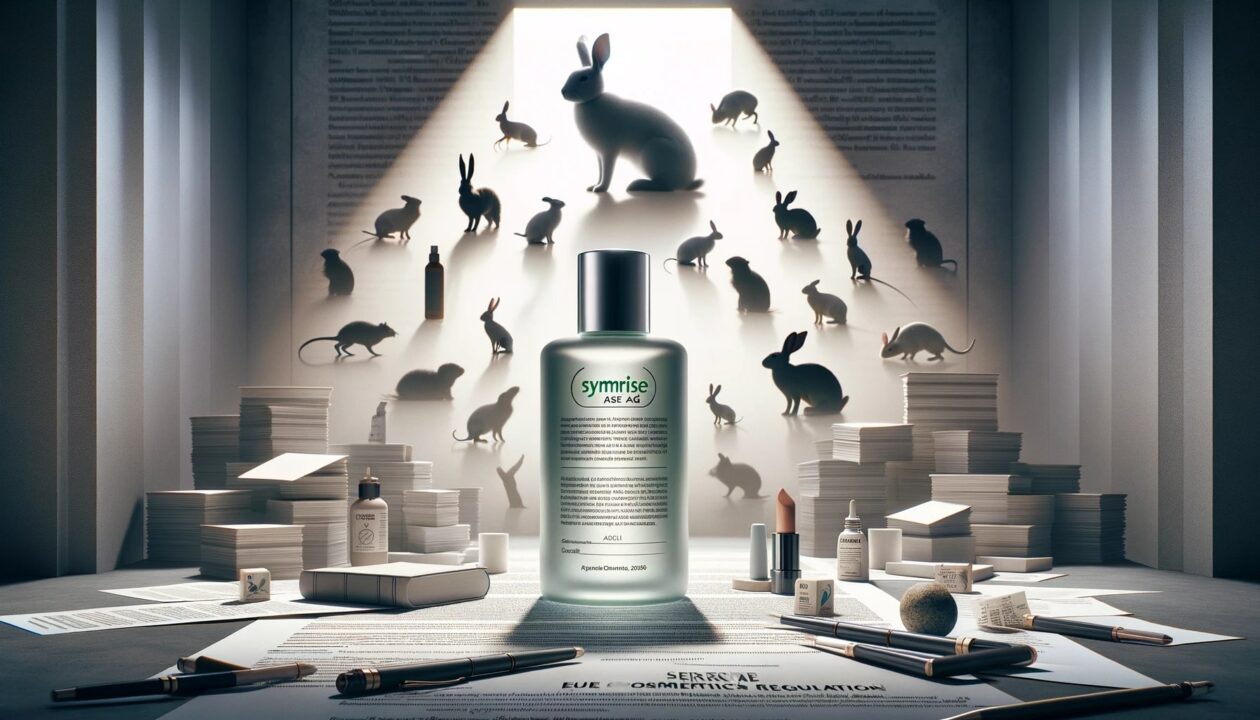News Article:
In a world where beauty and ethics often collide, a recent development has stirred the pot in the cosmetics industry, challenging long-standing practices and legal frameworks. At the heart of this brewing storm is Symrise AG, a corporate giant known for transforming chicken fat into an array of cosmetics. But it’s not their products that are making headlines this time – it’s their bold stance against animal testing.
Symrise AG’s refusal to conduct animal testing for a chemical used in their products, despite the European Chemicals Agency’s (ECHA) request, has sparked a fiery debate. This controversy isn’t just about a single company’s policy; it’s a clash of titans between the European Union’s Cosmetics Regulation, which strictly prohibits animal testing for cosmetics, and the REACH regulations, focused on controlling chemical risks.
As we delve deeper, the story unfolds with unexpected twists. Animal rights organizations, including the likes of PETA and Cruelty Free Europe, have raised the alarm, fearing that this case could render the EU’s ban on animal testing for cosmetics virtually meaningless. The situation has put these organizations in an unusual position of defending a company that, while refusing animal testing, is far from being cruelty-free in its other business practices.
What’s at stake here is more than just the fate of a few laboratory animals. This case could set a precedent that might redefine ethical standards in the cosmetics industry and beyond. As legal and ethical boundaries blur, Symrise AG’s stand has become a litmus test for the industry’s commitment to animal welfare.
But the plot thickens – amidst this legal and ethical quagmire, there’s a lurking suspicion that the company’s motivations might be more financial than altruistic. Are they truly champions of animal rights, or is this a calculated move to avoid the costs associated with animal testing and alternative research methods?
Join us as we unravel the layers of this complex saga, where beauty, ethics, and corporate strategies intertwine in an intricate dance. This story is more than just about cosmetics; it’s a reflection of our society’s values, legal systems, and the ever-evolving definition of ethical business practices. Stay tuned for more updates on this fascinating journey into the heart of the cosmetics industry.
Key Points
- Symrise AG, known for processing chicken fat into cosmetics, refuses to perform animal testing.
- This stance arises amidst a conflict between the EU Cosmetics Regulation and REACH regulations.
- Animal rights groups, including PETA and Cruelty Free Europe, express concerns over the effectiveness of animal testing bans in the EU and UK.
Background
- Symrise AG’s refusal to test a chemical used in cosmetics, 2-ethylhexyl salicylate, for worker exposure risks under REACH regulations has sparked a legal and ethical debate.
- The European General Court’s ruling is seen as a setback by animal welfare organizations.
Legal Context
- EU Cosmetics Regulation forbids animal testing for cosmetics.
- REACH regulation focuses on chemical risks, applying to substances in products, including cosmetics.
Implications
- The case highlights complexities in regulatory frameworks affecting the cosmetics industry and animal welfare.
- The decision raises questions about the future of animal testing bans in the European context.
Analysis
- Animal rights groups accuse Symrise AG of avoiding animal testing for cost reasons, not ethical concerns.
- Over 5,500 animals could be involved in the toxicity testing required by ECHA.
References
- Animals 24-7: Symrise AG & Animal Testing Controversy
- COSlaw.eu: Legal Perspectives on EU Cosmetics and Chemical Regulations
- PETA: Advocacy Against Animal Testing
- Cruelty Free Europe: Campaigns and Legal Stances
- European Chemicals Agency (ECHA): REACH Regulation
- European Union Cosmetics Regulation: Legal Framework
- Humane Society International: Global Efforts in Animal Welfare

